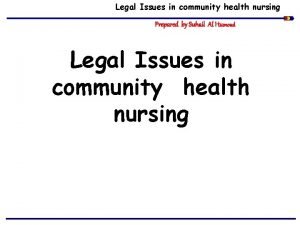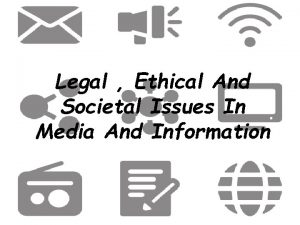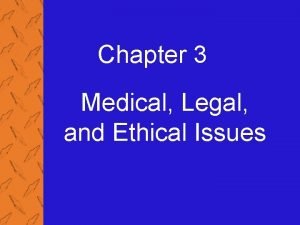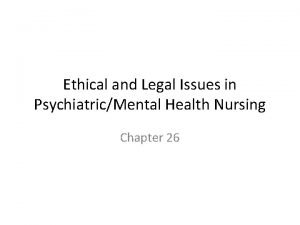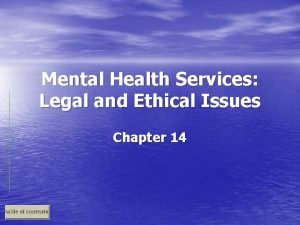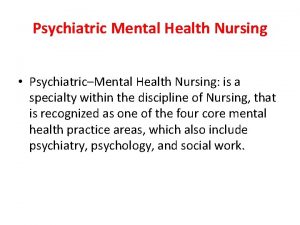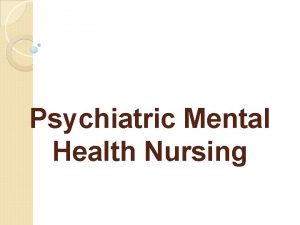INTRODUCTORY MENTAL HEALTH NURSING Introduction Legal Ethical Issues
















- Slides: 16

INTRODUCTORY MENTAL HEALTH NURSING Introduction Legal & Ethical Issues

Defining Mental Health • State of emotional well-being in which one “functions comfortably within society and is satisfied with their achievements in the areas of work, play, love and relationships. ”

Components of Mental Health • Self-control with socially acceptable behavior • Inner values • Growth-oriented • Tolerates uncertainty and stress with flexibility • Reality-oriented, sound judgment and decision-making • Experiences meaningful work • Humor • Optimistic • Spontaneity • Satisfying relationships • Ability to give and receive

Current Issues • Community-based care • Legislation – OBRA (Omnibus Budget Reform Act) – prevents inappropriate placement into nursing homes – Mental Health Act of 1983 – client rights – National Mental Health Parity Act (1996) – Lack of funds, cost to communities, families • Closing of psychiatric units, where do clients go?

Being a Psychiatric Nurse • Clients do not need us personally as friends or companions…they need us to teach them, and model HOW to have friendships and relationships outside of treatment in society as a whole

What About Change? • YOU WILL CHANGE • YOU CANNOT MAKE A CLIENT CHANGE – CHANGE IS THE CLIENT’S CHOICE • Client does the choosing, does the changing, and TAKES CREDIT when change occurs. WE LIVE WITH OUR CHOICES

ETHICS – a set of principles or values that provides dignity and respect to clients LEGAL ISSUES IN PSYCHIATRIC NURSING • Client Rights – Nursing Responsibility – Right to Appropriate Treatment – Right to know qualifications of those involved in treatment process – Right to receive explanations of treatment – Right to be involved in planning of own care – Right to refuse to be a part of experimental treatment methods – Right to understand the effects of prescribed medication – Right to treatment in least restrictive environment – Right to refuse treatment- decide which treatment option is best for them

Informed Consent • Explanation of client rights and unit policies to client/guardian • Signed statement of understanding/refusal to receive treatment • Explanation of insurance benefits or payment options/third-party reimbursement

Confidentiality • Client’s right – prevent written or verbal communications from being disclosed to outside parties without authorization • Required by Nurse Practice Act • HIPAA (Health Insurance Portability and Accountability Act of 1996 (2003)) – ensures that security procedures protect the privacy and confidentiality of information – client has right to know what information is disclosed, to whom, and for what purpose

Required Disclosure of Client Information • Intent to commit a crime • Duty to warn endangered persons • Evidence of child abuse • Initiation of involuntary hospitalization • Infection by HIV

Ensuring Privacy • Conduct nursing shift report in confidential area where others cannot hear what is being said • Do not discuss one client with another • Do not discuss client information via telephone (done only if privacy defined) • Always think before you act

Appeals & Grievances • Right to be informed of means to channel complaints about care/professionals providing treatment • Procedure to be followed to file a complaint to a professional board • Address of contact and procedure to appeal payment decisions

Nursing Accountability • Responsibility for own actions • Standard of Care for practice level (Nurse Practice Act) • Documentation • Client Advocate

Client Admissions- Considerations for Treatment – Client’s history – Current situation – Treatment and care needed – Inpatient vs. outpatient services – Residential facilities – Voluntary admission – Involuntary commitment • Order for Protective Custody • Court mandate (substance-abuse programs)

Seclusion and Restraint • Seclusion – placement of client in controlled environment to treat a clinical emergency • Physical restraint – use of mechanical devices to provide limited movement by client • Chemical restraint – use of medication to calm client and prevent need for physical restraint

Legal Implications • Qualifications and training of person initiating action • Physician’s order is a necessity • Facility rules and state laws • Liability for false imprisonment • Liability for assault and battery • KNOW LIMITATIONS OF THE LAW!
 Legal issues in community health nursing
Legal issues in community health nursing Ethical and legal issues affecting the nursing assistant
Ethical and legal issues affecting the nursing assistant Ethical and legal issues in psychiatric nursing
Ethical and legal issues in psychiatric nursing Legal and ethical issues in use of ict in education
Legal and ethical issues in use of ict in education Legal ethical and societal issues
Legal ethical and societal issues Professional issues ethics and computer law
Professional issues ethics and computer law Legal and ethical issues of e commerce
Legal and ethical issues of e commerce Legal and ethical issues in computer security
Legal and ethical issues in computer security Professional and ethical issues during internship
Professional and ethical issues during internship Chapter 2 ethical and legal issues
Chapter 2 ethical and legal issues Chapter 3 medical legal and ethical issues
Chapter 3 medical legal and ethical issues Legal and ethical issues chapter 3
Legal and ethical issues chapter 3 Ethical issues in computer security
Ethical issues in computer security Legal and ethical issues chapter 5
Legal and ethical issues chapter 5 Legal and ethical issues chapter 3
Legal and ethical issues chapter 3 Chapter 6 legal and ethical issues
Chapter 6 legal and ethical issues Legal and ethical issues chapter 5
Legal and ethical issues chapter 5
